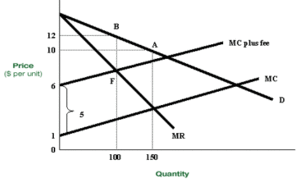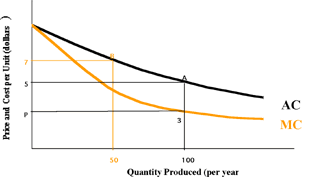Monopoly Price and Output with a Pollution Charge
Overview
Over the last several decades, environmental issues have become an integral part of corporate decision making. Concern for the environment has led to legislation and regulation that have significantly increased the cost of doing business. These, in turn, have spawned expensive litigation over compliance, corrective action costs, and natural resource damages. Economic analysis can help companies respond to legal and regulatory challenges in a way that minimizes these costs.
Legislation and Regulation
As the costs of environmental compliance and remediation become more apparent, some policy-makers are questioning the effectiveness of environmental requirements. Calls for regulatory reform and a greater reliance on markets to achieve environmental goals are based on basic economic principles. Secretariat Economists professionals have published articles on the costs and benefits of regulation and the need for regulatory reform. The economists at Secretariat Economists have also developed comments for clients on the economic impacts of regulatory and legislative proposals.
Litigation
Economic analysis plays an important role in environmental litigation. The valuation of damages associated with environmental accidents is primarily an economic exercise. Secretariat Economists professionals have combined state-of-the-art techniques and their own analytical insights to estimate claims of health, property, and business damages as well as damages to public natural resources. Economic analysis is also an important component of determining penalties for delayed compliance with environmental regulations. The economists at Secretariat Economists have helped private clients negotiate reduced civil penalties based on estimates of their economic gain from delayed compliance. Secretariat Economists professionals have also applied economic analysis and provided testimony in other proceedings related to CERCLA cost allocation and corrective action cases.
Implementation
Economic principles can support the effective implementation of environmental objectives. Evaluation of the costs and benefits of alternative pollution control strategies and projections of the economic consequences of alternative actions can aid in setting environmental priorities. Optimal use of emissions trading and other market incentives can also help to manage future risks and maximize the effectiveness of corporate environmental strategies. Secretariat Economists professionals have performed analyses for clients and published articles on the appropriate techniques for projecting the future costs and benefits of environmental actions as well as on emerging tools for assessing and controlling the financial risks of environmental management.
Overview
Economic analysis of strategic issues in business and government has become mainstays of the decision-making process. Studies are routinely used to inform business leaders about likely consequences of their decisions and to inform and influence the decisions of others. The need for economic studies has been driven by the overall importance of the economic aspects of the issues under consideration and the unique perspective that economists can bring to bear. Economic studies are used to assess the relative importance of sectors of the economy, the impact of proposed actions on businesses or government entities, the costs and benefits of proposed or past projects or decisions, the incentives that can arise from policies and many other purposes.
Secretariat Economists professionals are well equipped with the training and analytical tools to conduct a variety of economic studies. They use standard economic models as well as innovative approaches. They apply their judgment to the problem to evaluate whether a simple approach is best suited or whether a more complicated analysis is required.
Experience
Secretariat Economists staff has performed a variety of economic studies in many industries including copyright industries, natural gas, accounting, and others. For example,
- Copyright Industries in the U.S. Economy
- Market Definition, Market Power and Entry in Light of Global Competition
- Competition and Innovation: Relationships Between Market Structure and Innovation
- Interstate Natural Gas Pipeline Marketing Affiliates
- State-by-State Economic Contribution of U.S. Recording Industry
- Reorganization of USDA Packers and Stockyards Administration
- Cost and Control Structures in the Accounting Industry
- Exporters to the U.S. Apparel Industry
- Economic Importance of All-Cargo Air Carriers

Overview
Regulation has traditionally been viewed as correcting failures in the market mechanism. However, scholarly work preceding the recent deregulation movement highlighted inefficiencies introduced by the regulatory process. Experts on regulation now examine both the intended and unintended consequences of government intervention. Regulatory issues requiring economic analysis arise daily in the context of legislative and rule-making activities, the enforcement of regulations, antitrust cases, and rate proceedings.
Antitrust in Regulated Industries
Analysis of economic behavior in regulated industries poses some of the most challenging problems in economics. Regulation sometimes produces incentives for anticompetitive activities that would not be undertaken by unregulated firms.
Experience
Secretariat Economists professionals have contributed to the professional literature on regulation and regulated industries. While serving at federal agencies, they have participated in the formulation and implementation of regulatory policies. Economists at Secretariat Economists study the effects of regulations, participate in writing comments in response to proposed rule-making, and on many occasions testify concerning regulatory issues.
Secretariat Economists professionals have analyzed matters involving regulation or deregulation in many different areas, such as:
- Telecommunications — wireline and mobile telephone services, satellite services, telecommunications equipment, electronic information services
- Mass Media — television, television program supply, cable television, cable programming, radio, magazines, newspapers
- Health Care — hospitals, provider-service organizations, physician networks, health insurance, nursing homes
- Transportation — railroads, trucking, airlines, computer reservation systems, airports, pipelines, taxicabs
- Electric Power — delivered bulk power, transmission, retail electricity
- Natural Gas and Petroleum — market-based rates, incentive regulation
- Services — insurance, postal services, real estate brokerage, computer reservation services
- Banking — banks, thrifts, automatic teller machine networks, credit cards
- Food and Drugs — alcoholic beverages, tobacco, pharmaceuticals, fruits and vegetables
- Environment — natural resource damages, Superfund clean-ups, regulatory compliance, CAFE standards
- International Trade — dumping, countervailing duties, quotas, gray markets, services, standards
- Consumer Protection — deceptive advertising, disclosure, credit practices, product liability
- Financial Markets — program trading, intermarket regulation, off-exchange trading, insider trading


